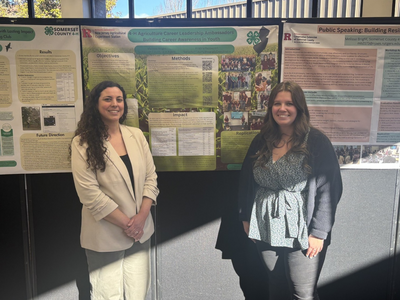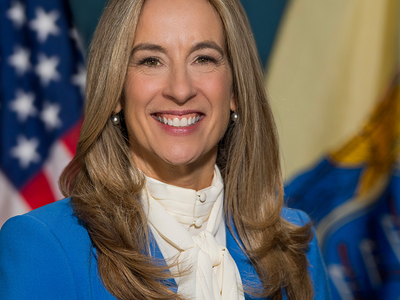| TRENTON – The Murphy Administration today kicked off NJ Climate Week by highlighting its work to make the state more resilient to growing climate impacts while also presenting the fifth Our Water’s Worth It award to The Watershed Institute for improving regional stormwater management. NJ Climate Week provides an opportunity to share the most recent climate science and actions being taken to address the causes of climate change and help residents, businesses, and communities across the state better adapt to and prepare for worsening climate impacts. “New Jersey will continue to experience some of the greatest impacts of climate change. As the most densely populated state in the nation, we face serious flooding threats,” said Governor Phil Murphy. “Through the work of DEP and coordination across many other state agencies, we are driving down our greenhouse gas emissions and providing the strong leadership and investments needed to equip our communities to better protect lives, property, and infrastructure.”
DEP presents Our Water’s Worth It awards to raise public awareness about the fundamental importance of protecting the state’s water resources. In presenting the Our Water’s Worth It award to The Watershed Institute, Environmental Protection Commissioner Shawn M. LaTourette noted the important role that strong stormwater planning and infrastructure play in making communities more resilient to intensifying climate impacts, including increased precipitation and more severe and frequent storms.“I commend The Watershed Institute for its commitment to protecting the environment of Central New Jersey and keeping our water clean, safe and healthy,” Commissioner LaTourette said. “The Watershed Institute understands the urgency to create a more climate-resilient future for all New Jersey residents. Throughout Climate Week, we are urging all residents to learn more about the very real threats of climate change, how it is impacting our lives, and the steps we can all take to be better prepared.”
“We are honored to receive this recognition from the New Jersey Department of Environmental Protection during Climate Week,” said Jim Waltman, Executive Director of The Watershed Institute. “Communities across New Jersey are experiencing the harmful impacts of climate change — from increased flooding to polluted stormwater that threatens both our health and our waterways. Addressing these challenges requires regional collaboration, and we are proud to help bring together municipalities, community leaders, and residents to find shared solutions. Together, we can build resilience for generations to come.”
“As a coastal state with dense development, climate change impacts like extreme heat, flooding, and sea-level rise pose immediate and wide-ranging threats to both our built environment and our natural spaces,” said Nick Angarone, New Jersey Chief Resilience Officer. “New Jersey state agencies are taking this risk seriously. Through a whole-of-government approach, we are working together to ensure our communities, infrastructure, ecosystems, and economy are resilient to a changing climate.”
“There is no doubt that the climate is changing, and so we must change as well. Local and statewide action is critical to building more resilient communities to the increasingly intense flooding we are experiencing as well as the seasons of prolonged drought. In New Jersey, we have too much water, except for when we don't have enough of it. At the Association of New Jersey Environmental Commissions, we are proud to be working with the DEP and municipalities across the great State of New Jersey to build climate resilient communities for this and the next generation,” said Jennifer M. Coffey, Executive Director of Association of New Jersey Environmental Commissions.
New Jersey’s Climate Progress
Over the past seven years, Governor Murphy has worked to address climate change – a significant threat to the state's natural resources and environment, public health, infrastructure, security, and economy. Through a coordinated, whole-of-government approach, the Murphy Administration has been working decisively to implement science-based policies and strategies to protect residents, businesses, and communities from worsening climate impacts.
In 2019, the Governor signed Executive Order 89, which set in motion many of the initiatives that have made New Jersey a national leader in climate mitigation and resilience. It also led to the state’s Climate Change Resilience Strategy and the formation of the Interagency Council on Climate Resilience, which includes 26 member agencies working to develop short- and long-term action plans that address the impacts of climate change.
DEP has made progress in several areas, including:
Following the Science
The landmark 2020 Scientific Report on Climate Change, and subsequent reports, for the first time synthesized the latest and most reliable scientific information on the current and predicted future impacts of climate change on New Jersey, providing essential information for taking actions to make New Jersey more resilient and reduce greenhouse gases linked to climate change and impacts to human health. An addendum to the report on climate change impacts to human health and communities followed in 2022.
The Rising Seas and Changing Coastal Storms study, commissioned by DEP and prepared by Rutgers University and leading climate change experts, provided critical information on potential sea level impacts in New Jersey, concluding that sea-level rise impacting the state is occurring at more than two times the average global rate.
Two New Jersey-specific rainfall studies by the Northeast Regional Climate Center, a National Oceanic and Atmospheric Administration (NOAA) partner, confirmed increases in precipitation across the state over the previous 20 years are greater than previously thought and projected further increases in precipitation intensity through the end of this century due to climate change. In addition, a report prepared by the State Climatologist and Rutgers University analyzed 120 years of precipitation data demonstrating increasing linear trends in annual precipitation.
Making the Coastline More Resilient
Through New Jersey’s Coastal Resilience Plan, the Administration is guiding local resilience planning to protect homes, businesses and infrastructure from flooding and sea-level rise.
DEP’s first-in-the nation Resilient Environments and Landscapes (REAL) reforms, upon adoption, will modernize coastal land resource protection rules to ensure that buildings and infrastructure are built to be resilient to future climate conditions and the threat of sea-level rise.
Through efforts such as the Rebuild By Design-Hudson, Rebuild By Design-Meadowlands, Storm Risk Reduction Projects at Port Monmouth and Keansburg, and the Union Beach Coastal Storm Risk Management Project, as well as ongoing beach nourishment projects, the DEP continues to ensure that coastal communities are protected from increasingly severe storms through robust beaches, dunes, and infrastructure.
Helping Communities Become More Resilient
More than 40 local governments are participating in resilience planning efforts coordinated through DEP’s Resilient NJ program, which supports the development of local and regional resilience action plans that use the best available climate science to plan for climate change impacts.
DEP’s Blue Acres voluntary buyout program enables homeowners to sell their flood-prone properties to the state, relocate to safer areas and create open space that serves as a buffer against future storms. In 2024, the program received its largest single-year funding allocation—$24.7 million through the state’s Corporate Business Tax. Since 1995, Blue Acres has acquired more than 1,200 homes across dozens of municipalities statewide, from the coasts of Cumberland and Ocean counties to the urban centers of Essex County and the suburbs of Somerset County. These properties now account for over 440 acres of open space, with capacity to absorb more than 100 million gallons of floodwater.
Addressing Inland Flooding and Aging Infrastructure
The Inland Flood Protection Rule, adopted in 2023 to address riverine flooding threats, serves as a critical component of the Administration’s comprehensive climate strategy by updating existing flood hazard and stormwater regulations to include precipitation estimates with modern data.
Through the State Revolving Fund and I-Bank funding programs, the Murphy Administration has provided more than $212 million through the New Jersey Water Bank to help communities upgrade antiquated local stormwater infrastructure to better handle increased and more intense precipitation events.
During Climate Week 2024, the Murphy Administration launched the DEP Ready to Be Resilient Stormwater and Resilience Funding Program, making $20 million available to modernize stormwater infrastructure and management strategies in the face of increased precipitation resulting from a warming climate.
Equipping the Public with Tools and Information
Providing the public with information and tools to better cope with and prepare for climate impacts, the Administration launched the state’s first-ever annual Extreme Heat Awareness Week and Flood Safety Week.
New Jersey’s Flood Risk Disclosure Law, adopted in June 2023, requires landlords and sellers of real property to make certain disclosures concerning known and potential flood risks. DEP developed the Flood Risk Notification Tool to assist individuals with meeting the disclosure requirements while the Flood Indicator Tool makes it easier for the public to understand and plan for flood risks in their communities.
Advancing Climate Change Mitigation
Through auction proceeds from the Regional Greenhouse Gas Initiative (RGGI) carbon dioxide cap-and-invest program, New Jersey has invested more than $230 million in climate change, clean energy, and equity programs across the state since 2020.
The adoption of the Advanced Clean Trucks and Advanced Clean Cars II rules spurs vehicle manufacturers to provide cleaner, more efficient vehicles which, in turn, increases consumer choice while reducing greenhouse gases.
More than $54 million in funding through DEP’s Natural Climate Solutions grant program has been made available to create, restore, and enhance New Jersey’s natural carbon sinks through projects such as tree plantings, living shoreline creation and salt marsh restoration.
The transportation sector is the number one source of greenhouse gas pollution in New Jersey. The state, through its successful electric vehicle initiatives, has achieved more than 254,000 electric vehicle registrations to date, growing from 11,000 in 2016.
Over $55 million has been awarded for 169 electric school buses since 2019, which includes money available from the Electric School Bus Grant Program to replace diesel buses that emit greenhouse gases and pollutants that are harmful to children.
Protecting the Public from the Impacts of Extreme Heat
New Jersey’s Extreme Heat Resilience Action Plan for the first time in state history is coordinating actions across state agencies to help the public take action to be better protected as the climate continues to warm.
Through Heat Hub NJ, a user-friendly online resource, the State has made it much easier for the public, in particularly vulnerable populations, to become more resilient to the impacts of extreme heat.
Responding to Growing Wildfire Risks
As climate change makes wildfire seasons longer and more unpredictable, the Murphy Administration launched NJ Wildfire SMART (Safety, Mitigation, Awareness, Response, Training), a series of actions that emphasize steps and informational resources for reducing wildfire risk and spread.
DEP’s Forest Fire Service targets treatment of 25,000 acres of forest and grasslands annually through a proactive prescribed fire program. The use of prescribed fire mitigates the risk of more frequent and intense wildfires in a changing climate, enhances habitats for plants and animals, and safeguards ecosystems. Prescribed fire is a critical part of the state’s carbon defense strategy, allowing experts to direct the intensity, timing and interval of fire across the landscape. Reducing forest debris can decrease the amount of carbon released into the atmosphere by preventing large, high-intensity wildfires.
Making Ecosystems More Resilient
Developed in partnership with Rutgers University, the Coastal Ecological Restoration and Adaptation Planning Tool provides the locations of at-risk areas, coastal resource restoration sites, and other data to help coastal municipal planners and non-profit organizations coordinate coastal restoration projects that support the health of coastal ecosystems.
The New Jersey Tidal Wetland Monitoring Network, formed in 2018, tracks current conditions and trends of tidal wetlands in New Jersey to improve resilience of coastal communities and ecosystems by providing data to prioritize restoration efforts and support informed management decisions.
DEP Fish and Wildlife, in collaboration with conservation partners, the U.S. Army Corps of Engineers, and New Jersey Department of Transportation’s Office of Maritime Resources, is advancing nature-based solutions—such as the beneficial use of clean dredged material—to restore and enhance wildlife habitat within New Jersey’s Wildlife Management Area System. Hundreds of acres of wildlife habitat have been restored to date, including habitats critical to threatened and endangered species.
Our Water’s Worth It Campaign
The DEP launched the Our Water’s Worth It campaign in 2024 to raise public awareness about the fundamental importance of water supplies, the threats they face, and the steps DEP is taking to ensure all New Jerseyans have access to clean drinking water and healthy waterways.
Previous Our Water’s Worth It awards have gone to Ridgewood Water for its efforts to conserve water and address PFAS contamination, Lambertville for its exemplary stormwater management program, the New Jersey Drinking Water Quality Institute for establishing PFAS public health standards, and the Camden County Municipal Utilities Authority for protecting public health by reducing combined sewer discharges.
The Watershed Institute
Since 1949, The Watershed Institute has worked to protect water resources and the environment through a combination of conservation, advocacy, science, and education. The organization has worked tirelessly over the last several years to help communities form regional watershed working groups that address stormwater management by organizing and holding meetings, providing critical educational materials and legislative resources and interpretations, arranging for contractors, and empowering individuals to bring regional stormwater solutions to their municipalities to secure funding.
Expanding on the successful creation of four regional working groups, The Watershed Institute’s Guide to Developing Regional Watershed Improvement Plans helps local governments and environmental organizations develop their own work groups. Learn more about the regional collaboration in the Stony Brook, Upper Millstone, Lower Millstone, and Assunpink watersheds at https://thewatershed.org/watershed-improvement-plans/guide-to-regional-watershed-improvement-plans-2025/. |











